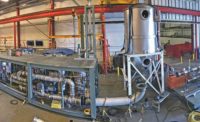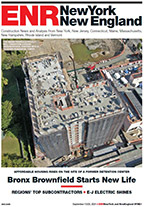With an in-house pipe fabrication shop and a sheet-metal shop, CCI aims to be a single-source provider for mechanical systems. In-house engineering and installation teams work with in-house pipe and sheet-metal fabricators to complete a project from design through construction.
"Depending on the project, we're seeing anywhere from 10% to 30% labor savings with prefabrication, but the biggest benefit and competitive advantage has been our ability to compress the amount of time needed for installation," says Pat Lynch, CCI's vice president. "We can accommodate the very tight schedules and budgets that have become more common since the recession hit."
The company continues to explore innovative prefabrication methods for piping as well as for complete HVAC assemblies. CCI showcased its prefabrication capabilities at the truck service facility in South Jordan, Utah, for Rio Tinto Kennecott, the nation's second-largest copper producer. CCI's crews prefabricated and installed 40,000 linear ft of piping.
With prefabrication work increasing, the company has outgrown its existing 10,000-sq-ft shop and is now evaluating different options for expanding its operations, Lynch says.
Marketing Craftsmanship
CCI employs roughly 300 workers, including engineers and LEED-accredited professionals who focus on design-build projects. CCI's field personnel are union employees recruited through the local union halls.
Anyone who shows foreman potential is put into a foreman-training program, and CCI's extensive safety training is overseen by a full-time safety director. With 552,739 man-hours worked in 2012, the company had eight recordable injuries (including only one lost-time injury)—up from five recordable injuries (including two lost-time injuries) in 2011.
"Our relationships and reputation are critical to our success. It all comes down to our people. Our craftsmen are the quality we sell," Lynch says.
Founded in 1961, the company has completed more than $600 million in mechanical construction, including projects for Procter & Gamble, Intel Micron Flash Technology, Consonus Technologies, St. Regis Resort and Sysco Foods.
Additionally, CCI is known for its work on a number of public and government projects, including the F-22 repair facility at Hill Air Force Base in northern Utah. Among CCI's recent work is the new six-story public safety building in Salt Lake City—the first public safety building in the country to earn a net-zero energy rating. CCI's installation of radiant heating and cooling systems was critical to reducing building-energy loads.
The company's staying power is supported by a willingness to evolve and embrace change, Mullholand says.
"We have always worked hard to anticipate what the market and our customers are going to need years down the road," he says. "Five years ago we made a big investment in building information modeling software and training, and now it's the norm."
Where CCI's engineering and installation teams leave off, CCI's maintenance team takes over. More often than not, the company wins the maintenance contracts for the systems it installs. In 2011, CCI installed the mechanical systems for the FBI division building in Salt Lake City, and then won the contract for ongoing service and maintenance.
"There are not many contractors that impress me, but I was particularly impressed by the communication among different teams during the installation, and how they kept everyone informed," says TD Erekson, chief building engineer for the FBI division building.
In 2014, CCI crews will be working on a number of projects throughout the region, including a 200,000-sq-ft distribution center near Las Vegas for food distributor Nicholas & Co. and the new North American headquarters for the climbing company Petzl, located near the Salt Lake City airport.



Post a comment to this article
Report Abusive Comment